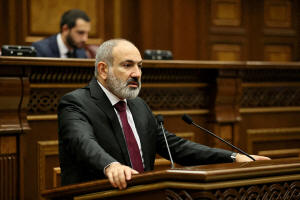|
After decades of enmity between Baku and Yerevan, Azerbaijan
last month retook the contested region of Nagorno-Karabakh in a
lightning offensive, prompting the mass exodus of most of its
120,000 ethnic Armenians to neighbouring Armenia.
Since then, the two South Caucasus countries have both declared
a willingness to sign a peace deal, though progress has been
fitful and regular border skirmishes have continued.
"In the coming months (we hope) we shall sign with Azerbaijan an
agreement on peace and the establishment of diplomatic
relations," Pashinyan said through an interpreter at a forum in
Tbilisi also attended by the prime ministers of Azerbaijan and
Georgia.
Azerbaijani Prime Minister Ali Asadov told the forum that Baku
had been committed to peace and the restoration of transport
links with Armenia since 2020, but that progress hinged on
Yerevan's willingness to act.
Karabakh, regarded internationally as part of Azerbaijan, had
been ruled by breakaway ethnic Armenians since the breakup of
the Soviet Union in the 1990s until last month.
Pashinyan also said on Thursday that Armenia hopes to open its
border with Turkey, a close ally of Azerbaijan, to citizens of
third countries and holders of diplomatic passports.
That frontier has been closed since 1993, when Turkey cut off
relations with Armenia as war raged between Yerevan and Baku
over Nagorno-Karabakh. Turkey has declined to reopen the border
without a peace settlement between Yerevan and Baku.
Separately, the Kremlin said on Thursday it hoped that Armenian
authorities would clarify comments made by Pashinyan in an
interview with the Wall Street Journal that he saw no advantage
in retaining Russian military bases in Armenia.
According to a full transcript of the interview published by
Armenian state news agency Armenpress on Thursday, Pashinyan
also said that Yerevan was "not discussing" calling on Russia to
remove its troops from Armenia.
Russia has several military facilities in Christian Armenia,
which remains a treaty ally of Moscow. Relations have soured in
recent months, with Armenia accusing Moscow of failing to
support it against mainly Muslim Azerbaijan, with which Russia
is also allied.
In its turn, Moscow has accused Pashinyan of neglecting
Armenia's traditional close ties with Russia and pivoting
increasingly towards the West.
(Reporting by Felix LightEditing by Gareth Jones)
[© 2023 Thomson Reuters. All rights
reserved.] Copyright 2022 Reuters. All rights reserved. This material may not be published,
broadcast, rewritten or redistributed.
Thompson Reuters is solely responsible for this content.

|
|




